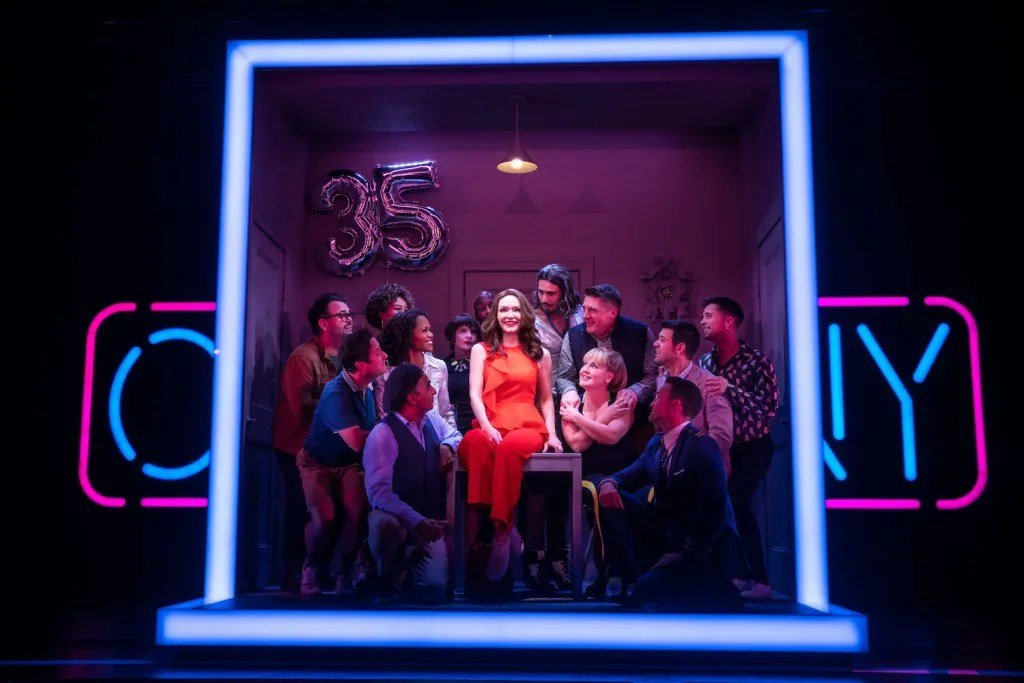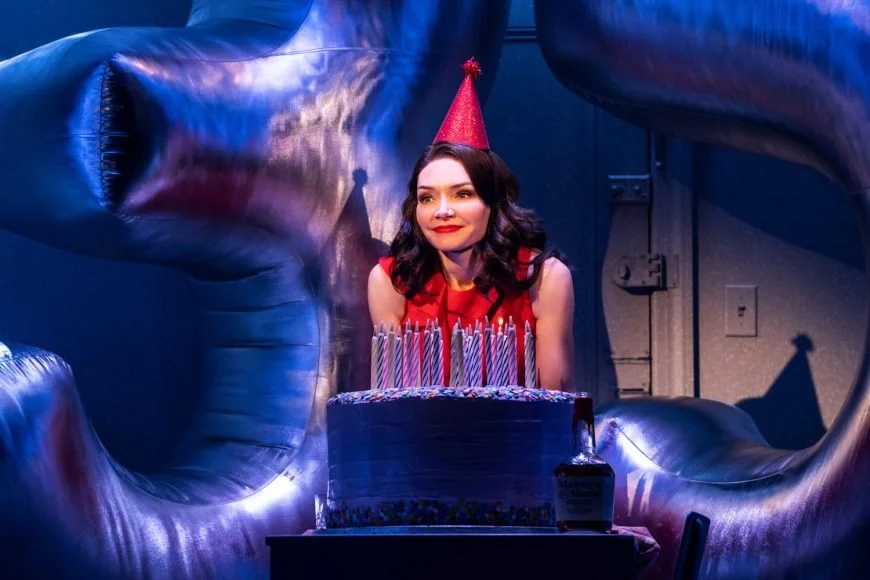Company
The cast of Company
“We’re all mad here,” the Cheshire Cat beguilingly informs Alice as she tentatively works her way through Wonderland. The same can be said of the characters in Company, the timeless and refreshingly relevant revival playing on Broadway at the Bernard B. Jacobs Theater.
Stephen Sondheim and George Furth’s musical examination of marriage first premiered on Broadway in 1970. At times offering astonishingly insightful and others frustratingly disconnected, the “concept musical” chronicled the mishaps and misadventures of Bobby, a confirmed bachelor placed at the center of a group of married friends, all of whom frequently wonder why he doesn’t find a nice girl and settle down.
Half a century has passed, and much about marriage has changed, as this revival informs us. Directed with piercing insight by Marianne Elliot, Company has been modernized. Women are the breadwinners, gay couples are getting married – with Matt Doyle’s brilliantly rapid-patter “Not Getting Married Today” stopping the show in its tracks – and Bobby is now Bobbie, a 35-year-old woman played with sensuous curiosity by Katrina Lenk.
It’s Bobbie’s birthday, which we learn as she stumbles through her apartment door, clutching balloons and a bottle of Maker’s Mark. As her friends gather to wish her a happy birthday, Bobbie reflects on their company, asking, “That’s what it’s all about, isn’t it?”
We are forced to ask ourselves the same question as we watch Bobbie spend time with couple after couple, observing their marital dynamics, sometimes thoughtfully, sometimes with humor and sometimes with horror. There’s Sarah (Jennifer Simard) and Harry (Christopher Sieber), who turn denial into a kink, acting out their cravings for food and drink through Krav Maga. Susan (Rashidra Scott) and Peter (Greg Hildreth) only find romantic and familial bliss after divorcing, while Jenny (Nikki Renee Daniels) and David (Christopher Fitzgerald, capable of inspiring laughter simply by walking across a stage), simultaneously indulge and accept each other, personifying the cliché that opposites do attract. Jamie (Doyle) and Paul (Etai Benson) contemplate if love and marriage are indeed counterparts. And Joanne, the brittle, brined, thrice-married matron is brought to live with vivid glee by Patti Lupone, supported by her understanding husband, Larry (Terence Archie).
Patti LuPone and Katrina Lenk
It’s a Wonderland of coupledom, vividly constructed through Bunny Christie’s scenic design and Neil Austin’s lighting, and Bobbie is Alice. She moves from room to room through doors of all sizes, falling through holes and crawling through tunnels, weighing the pros and cons of marriage. It doesn’t help that her friends urge her to walk down the aisle while simultaneously envying the freedom that her single status provides. They just don’t understand how a successful, attractive woman could not be married and Bobbie’s explanation – she wanted to establish herself in her career and enjoy dating casually – carry an unspoken urgency absent from the original production, thanks to the faint sound of a baby crying echoes throughout the show, inspiring thoughts of her biological clock.
Bobbie may be single, but she’s hardly alone. A trio of her beaus – likely met online, given the frequent presence of smartphones onstage – reveal different aspects of her fear of commitment: the offbeat, adventurous bohemian P.J. (Bobby Conte), the sweet, committed Theo (Manu Naravan), and the handsome but dim flight attendant Andy (Claybourne Elder). Their lament of Bobbie’s commitmentphobia, “You Could Drive a Person Crazy,” showcasing Liam Steel’s precise choreography, perfectly captures their frustration.
One might ask, why is a show like this revelatory in 2021? It shouldn’t be as noteworthy as it is for Bobbie to be female. A single woman in her thirties shouldn’t be unusual. A woman who focused on her career before marriage shouldn’t be unique. The main character of a musical who is indecisive about motherhood shouldn’t be rare. But in today’s culture and industry, somehow it is. And Sondheim’s words and music from 50 years ago are still and newly germane, none more than the second-act standout, “Side by Side by Side/What Would We Do Without You?”
What begins as a wry commentary from Bobbie on her happily-assumed role of the third wheel transforms into a maniac party game that leaves Bobbie exhausted and physically ill. The song originally depicted Bobby slowly realizing that, despite his friends, he is actually alone and there are moments where he will be left behind. But Elliot’s staging brings to mind the term “emotional labor,” often applied to women in heterosexual partnerships, as her friends’ claustrophobic affection for her evolves into a frantic and desperate need. (It also offers a darker side to the opening number, as Bobbie declares, “And you I love, and you I love, and you and you and you I love…”)
Katrina Lenk
Bobbie’s exhaustion from being there for other people is what to her ultimate breakthrough. In Furth’s original script Bobbie asks, almost by accident, “But who will I take care of?” But Lenk’s Bobbie has the opposite desire, asking, “But who will take care of me?” This vulnerability shines through in the final number, Sondheim’s self-examination, “Being Alive.” Often concluding with a triumphant intensity, at times even a primal roar, the song sung by Lenk is softer and more fragile.
This Company is new and it’s different, but it’s also necessary. Revivals are not meant to be carbon copies of the original, and Company in 2021 presents a decades-old production with a fresh new perspective. And that’s what it’s all about it, isn’t it?



